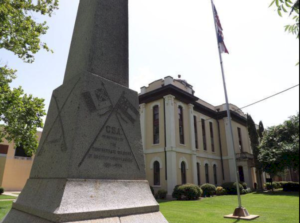Courtesy of Bastrop Advertiser
July 16, 2020
By Bill McCann
My grandfather was a history buff, especially the Civil War. He entertained us kids with stories of historic battles. He recounted how the Union Army kicked Gen. Robert E. Lee and his Confederate rebels out of Pennsylvania our home state at Gettysburg and turned the tide of the war. We were most captivated when Grandpap talked about his father, my great-grandfather, John. Grandpap said John was a war hero, who was briefly imprisoned by the rebels.

I don’t recall Grandpap saying much about why the war started, though he frequently spoke of his favorite president Abe Lincoln freeing the slaves who often suffered at the hands of their owners. “My father told me real life wasn’t like the happy-go-lucky life of the negro in the silent movies,” Grandpap said.
Grandpap taught us to recite the Gettysburg Address. I still remember much of it, including the part about all men being created equal. But it wasn’t until a college history class that I came to learn about slavery’s significant role in the war. In writing a paper about the Confederacy, I learned that the southern states formed the Confederacy largely to protect what they believed was their right to keep slaves. Secession documents by various southern states made that crystal clear, no matter how much some folks have since tried to twist history.
Years later I also learned much more about great-grandfather John at the National Archives in Washington D.C. He was long dead by then, as was Grandpap. Documents showed John joined the Union Army in Pennsylvania at age 12 to help support his impoverished family. He was a private and drummer boy. His regiment fought at Gettysburg and attended Lee’s surrender at Appomattox. He received an honorable discharge at age 15, and eventually a small military pension. He adopted Grandpap and three other young siblings in 1900 at age 50.
Initially, I thought a drummer boy was no hero. That was until I researched how valuable those kids were to the military. Soldiers went to bed and arose to the beat of drums. Different drumbeats signaled orders from commanders for soldiers to charge or halt or retreat. When the battle ended, they helped treat wounded and carry off the dead. Those kids, some of them Blacks, were in the middle of it all. Sometimes they died.




